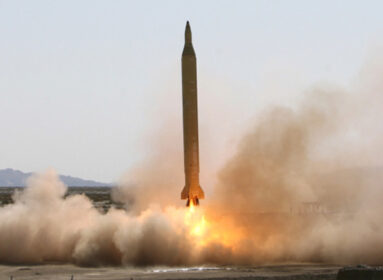
The director of Trinity’s Greenberg Center for the Study of Religion in Public Life talks presidential politics
By Cindy Mindell and Judie Jacobson
JEWISH LEDGER (JL): The pundits and pollsters talk about Jews as if we vote as a monolith. Is that a fair assessment? And, if so, are we seeing a shift in the way Jews vote?
MARK SILK (MS): The Orthodox have become Republican voters and if the Jewish population is 10 or 15 or maybe percent, you’re going to get big Republican votes out of them no matter who the candidate is. The rest of the Jewish population is strongly Democratic. There was some turning away from Obama in 2012 compared to 2008 among Jews, but there was some of that in just about every group: his majority was smaller in 2012 than it was in 2008.
Regarding these issues of religious identification with particular political parties, in quite a few minority religious communities, they’ve become quite distinctive: Mormons are overwhelmingly Republican now in a way they used to not be; as white Evangelical Protestants are overwhelmingly Republican in a way they used to not be; Jews have been Democrats for a long time and they remain pretty Democratic, although the move away from that by the Orthodox is notable, and to the extent that the Orthodox are a growing segment of the Jewish population, that’s going to be more important. Latino Catholics are very Democratic. White Catholics are an interesting group because they swing both ways: in recent years, they’ve been more Republican than Democratic but not by a huge amount. This year, there are some signs that they’re evenly balanced. Mainline Protestants are generally more Republican than Democratic, and it will be interesting to see if that evens out: the signs are that that’s not so much the case.
You get these profiles that don’t tend to change so much from election to election. It’s pretty clear that the American Jewish population as a whole didn’t buy the Israeli line that Obama was hostile to Israel and therefore hostile to the Jews. There was some of that but not that much.
If you’re concerned about Israel based on what the candidates have said and who they’ve cozied up to and so on — I’m not saying that you should vote based on Israel but if you are — it seems to me bizarre that you wouldn’t vote for Clinton over Trump. I’m saying this as objectively as I can, based on Trump’s cuddling up to Putin, his general sense of not wanting to be very involved abroad. His positions do tend to shift; his rhetoric can sometimes make you think that he stands for something and then for something else. But if you’re a sober analyst and somebody concerned about the future of Israel, [you count on] a dependable character like Hillary Clinton, who seems generally to have been more hawkish than Obama when she was Secretary of State. There is some evidence that the Israelis themselves would prefer Clinton to somebody like Trump.
I wouldn’t expect any notable departures in the Jewish vote this time around. It’ll probably look pretty much the way it did in 2008 and 2012.
JL: Jews are so small a segment of the population. Do we really matter to a candidate?
MS: You can matter in terms of campaign contributions and you can matter in terms of votes. There is significant wealth in the Jewish community and on both times, particularly on the Republican side, the Sheldon Adelsons of the world can contribute a lot of money. So far he, like some other big donors such as the Kochs, have been withholding support from Trump. That matters.
In terms of votes, the Jewish vote doesn’t matter much in many places but it can matter in places where the Jewish population is concentrated in particular areas and in places like Florida. Certainly, as we know from the 2000 election, a few Jewish votes this way or that way can be the difference in the state if it’s narrowly balanced. I think the Jewish vote per se will count this year in Florida and conceivably Georgia and in Ohio. Every group’s vote matters in places like that.
JL: Do you think that Bernie Sanders’s Jewish identification — or lack thereof — impacted his bid for the nomination?
MS: The most extraordinary thing about the Bernie Sanders campaign was that you have this classic Jewish candidate who’s not religious and the absolute exemplar of the kind of leftist Jew who represented Communism and everything alien to Christian values and nobody said a word about it. If that isn’t testimony to the extent to which antisemitism is really a trivial matter to be concerned about in American society, I don’t know what is.
If Bernie had showed up in a yarmulke at synagogue regularly, I think there would have been some Jews who would have liked that, but he didn’t do that. I think that there was a certain reluctance on his part to declare his identity in that way. When pushed, he was able to do that, but to make a big show of being a synagogue-goer and showing up with a yarmulke and being called up to the bimah – it’s totally not Bernie Sanders. If he’d gone that route, he could have drawn a lot more criticism from the Jewish community for pretending to be some kind of observant Jew. There was some objection from Rabbi Jeffrey Salkin, who writes a column for the Religious News Service, that Bernie never associated himself with any Jewish organization when he was mayor of Burlington or just a guy in Vermont as opposed to a presidential candidate. I think that’s fair enough — of course, rabbis like people to identify with Jewish institutions.
JL: The topic of your talk is “One Nation under God, Divided by Politics.” Do you believe that this presidential election is more divisive than others?
MS: I think this has been an extraordinary election in a lot of ways and in some ways, more divided or at least divisive. It’s unclear whether the extent to which the divide has been on religious lines, even defined in terms of certain kinds of issues. For example, there are a lot of Evangelical leaders who would normally be enthusiastic supporters of the Republican nominee and really talk about the social issues and now they’re not doing that; some of them are extremely hostile to Donald Trump. It’s an ugly election. What do we really mean by “divisiveness?” There certainly are strong feelings and where you’ve got strong feelings on both sides, you’ve got people who are very divided between themselves or critical of those on the other side. But in terms of blocs or in terms of particular issues, it’s muddy in a lot of areas.
JL: Both these candidates are engendering strong negative emotions that seem to be visceral. Do you think that there will be, or can be, a healing after the election (regardless of which candidate wins), or will the chasm between the electorate widen?
MS: If Donald Trump is elected, I think the feelings of hostility will remain and I would predict, if anything, increase. On the other side, opponents hate Hillary a lot. There was certainly hostility in Congress to Barack Obama when he was elected in 2008 but there really was a period of warm feelings, in part because these two people are so unpopular and so well known, as people imagine them to be. So the normal kind of “Here’s a new guy, it’s a new day, we all are going to try to work together,” I just don’t see any of that. It’s bad.
“One Nation, Under God, Divided by Politics” with Prof. Mark R. Silk, founding director of the Leonard E. Greenberg Center for the Study of Religion in Public Life at Trinity College: Wednesday, Sept. 21, 12 noon, Beth El Temple, 2626 Albany Ave., West Hartford. For information: (860) 232-1409 or (860) 236-6706. Tickets: $12 (includes lunch)







 Southern New England Jewish Ledger
Southern New England Jewish Ledger













